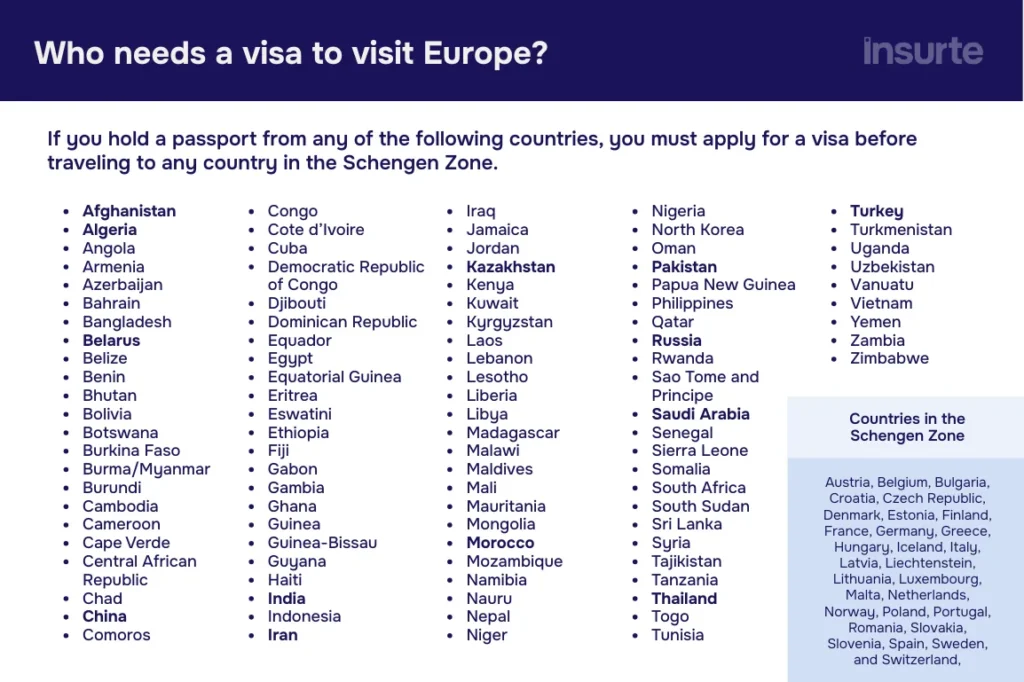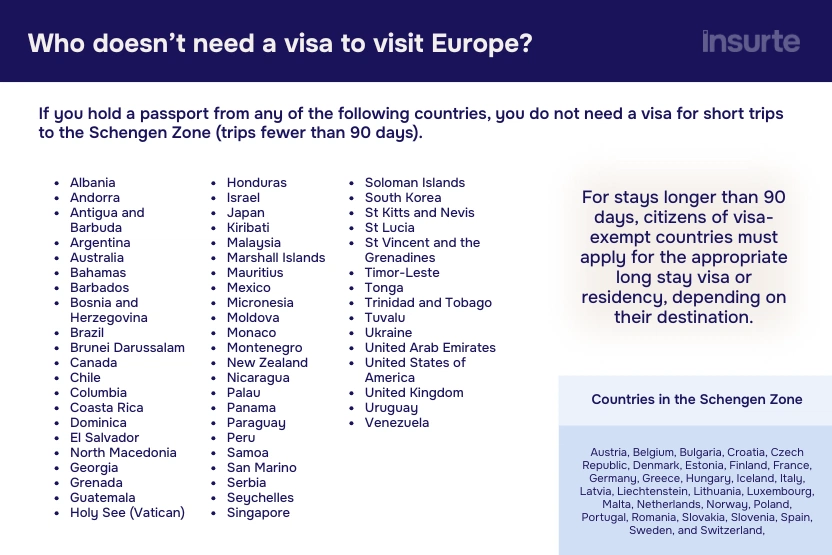Home > Apply for a Schengen Visa for the Czech Republic

Apply for a Schengen Visa for the Czech Republic
Planning a trip to the Czech Republic? Whether you’re visiting this beautiful country for tourism, business, studies, or something else entirely, understanding the visa process is key to ensuring everything goes smoothly.
This guide is here to help you navigate the process with ease, so you can focus on the excitement of your upcoming adventure, whether it’s visiting the stunning streets of Prague or finding your inner peace at the thermal springs of Karlovy Vary.
Who needs a visa?
Whether or not you need a visa depends on your nationality, the nature of your visit, and the duration.
Since the Czech Republic is a part of the Schengen area, its visa rules follow the Schengen visa guidelines.
If you’re from a country that does not have a visa waiver agreement with the Schengen zone (such as India or China), you will need a visa to travel to Czechia.

Do US citizens need a visa for the Czech Republic?
US citizens do not need a visa for short stays in the Czech Republic (up to 90 days within a 180-day period) for tourism, business trips, or family visits.
However, if your trip extends beyond that or involves working or studying, you’ll need to apply for a suitable long-stay Czech visa.

Who else doesn’t need a visa to visit the Czech Republic?
Citizens of EU, EEA, and Schengen zone member countries can enter the Czech Republic without a visa. Additionally, travelers from countries with visa waiver agreements, including Canada, Australia, the US, and the UK, can also enjoy visa-free entry for short stays of up to 90 days. Any visits exceeding 90 days require a visa.
How long can you stay in the Czech Republic without a visa?
You can stay up to 90 days in Czechia without a visa, so long as you're visa-exempt. To return to Czechia (or anywhere in the Schengen area, for that matter), you will need to leave the Czech Republic for 90 days before you can return.
The rule is: you can stay in Czechia for up to 90 days in any 180-day period.
How to apply
The Czech visa application process depends on the reason for and duration of your visit. Once you’ve figured out the right type of visa, the next step is to gather your required documents and submit them (in person) to a Czech visa center or consulate in your country of residence.
Can I apply for a Czech visa online?
Currently, the Czech Republic doesn’t offer a fully online visa application. However, you can start the process by completing an application form online, and then printing and finalizing it in person at the Czech embassy or consulate.
Always double-check the specific requirements for your visa type ahead of time.
In the coming years, travelers will be able to apply for Czech visas online through an official website called EU VAP.
This platform won’t be fully operational until 2030, but it’s good to keep in mind for the future. Even still, the process won’t be 100% online. With EU VAP, applicants will still be required to attend an in-person appointment to submit their biometrics (fingerprints).
Is it difficult to get a Czech visa?
The application process is generally straightforward when it comes to Czech visas, as long as you meet the necessary criteria. For longer stays, additional documentation is usually required, and the process may take more time.
While many Czech visa applications are approved, as long as all of the requirements are met, approval is never guaranteed.
What is the rejection rate for Czech visas?
In 2024, 15.8% of Czech visa applications were denied. When rejections happen, it’s often due to incomplete applications or a lack of evidence proving sufficient financial means.
Keep in mind that rejection rates can change due to a wide variety of factors, such as visa type, nationality of the applicant, etc.
Processing times
Short-stay visa applications usually take around 15 business ,days to process but can take longer. For long-term visas, such as for work or study, processing may take up to 180 days or more. This is why it’s important to plan and apply for your visa early.

Czech Republic visa application requirements
Your visa requirements will depend on the type of visa you're applying for.
Tourists, employees, and students have different requirements, and it’s important to have all your documents prepared in advance to ensure a smooth application process.
What documents are needed for the Czech visa application process?
There are a few essential/basic documents that the majority of Czech visa applications require. Then, depending on the visa, there will be additional documents required.
Here are the typical documents that most Czech visa applications will need:
- A completed visa application form.
- A recent passport-sized photo.
- A valid passport (with at least 3 months beyond your intended stay).
- Proof of compliant Schengen travel insurance.
- Proof of accommodation (hotel bookings or an invitation letter from a resident).
- Evidence of financial means to support you during the entirety of your stay.
- Return or onward travel tickets.
Czech tourist visa and visitor visa requirements (Type C, short-stay)
For short stays (under 90 days), you’ll need an application form, passport-sized photos, a valid passport (with 3+ months beyond your intended stay), proof of Schengen-compliant travel insurance, proof of accommodation, proof of financial means, and a flight itinerary.

Is there an interview when applying for a Czech visa?
Yes, for Czech visas, in-person interviews are required. These interviews must be booked in advance and take place at a Czech consulate or embassy in the applicant’s country of residence.
In the coming years, the Czech visa application process will be online. In-person appointments will still exist, but their purpose will be for biometric collection.
ETIAS vs Czech visas
Starting in 2026, citizens from visa-exempt countries will need to apply for ETIAS (European Travel Information and Authorization System) to enter the Czech Republic for stays under 90 days.
If you hold a current, valid Schengen visa, you are exempt from the ETIAS requirement.
Who needs an ETIAS to enter the Czech Republic?
Travelers from visa-exempt countries like the US, Canada, the UK, Australia, and Japan will need to apply for ETIAS before entering the Czech Republic for short stays once the system is in place.
Is the Czech Republic part of the Schengen zone?
Yes! Since the Czech Republic is a Schengen zone country, your Czech visa allows you to travel freely within the entire Schengen area, including destinations like France, Italy, and Germany.
Traveling with your visa
In most cases, you can travel within all of the EU countries that are also in the Schengen agreement if you have a Czech visa. This excludes European countries that are not in the Schengen area, such as Ireland and the UK.
Key takeaways for the Czech Republic visas
- There are a variety of types of visas for the Czech Republic.
- Each visa type has specific document requirements.
- The Czech Republic is part of the Schengen zone.
- To apply, you must have Schengen-compliant travel insurance, and proof of it at the time of your consulate appointment.
- To apply, in most cases, you must have proof of sufficient funds, flight itinerary, and proof of accommodation.
- Some Czech visas allow you to work abroad, others don’t.
- Processing times vary from 15 days or more.
- You must apply for a Czech Republic visa in-person at a Czech consulate or visa center.
- In the coming years, you will be able to apply for a Czech visa online with EU VAP.
- The Czech Republic offers a digital nomad visa for nationals from specific countries (such as the USA).
